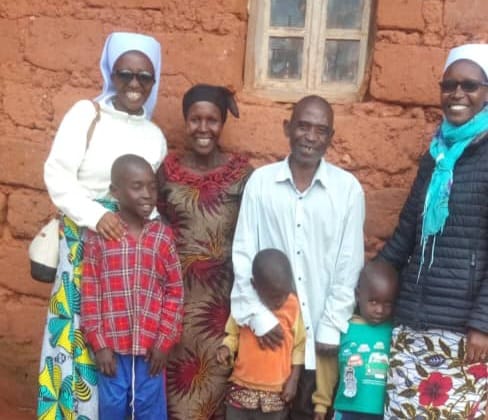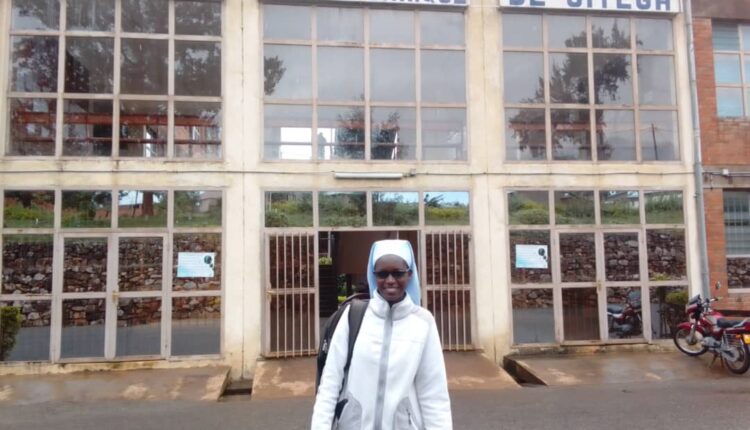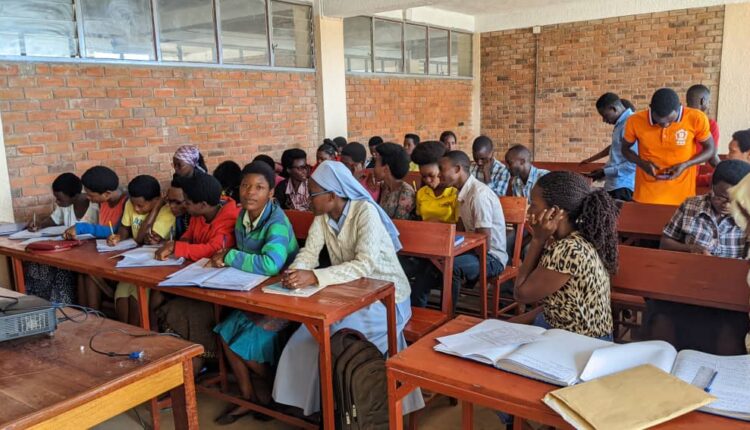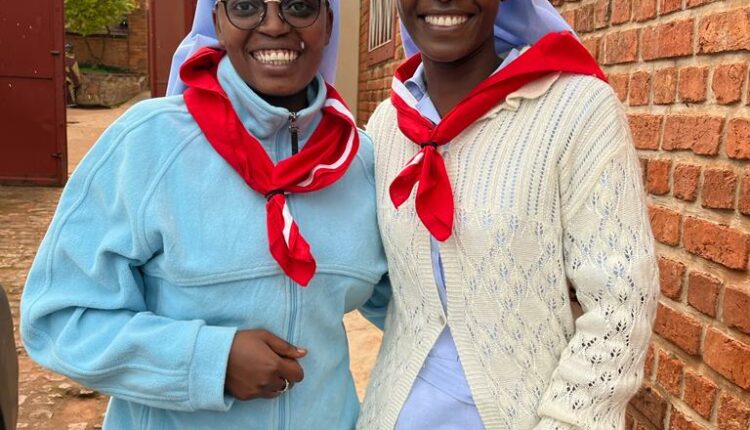
God’s Mercy at work
God’s Mercy, my Mission
My name is Sister Alice Inteyiteka from the Congregation of the Bene Mariya Sisters in Burundi. Thanks to Spazio Spazioni’s “Invest in a Sister” project, I’m studying at the UPG Polytechnic University in Gitega/Burundi in the Faculty of Accounting, Control and Auditing.
In 2021, I spent six months at the Misericordia of Monte San Savino in Arezzo, Italy. It was a source of inspiration that greatly enriched my mission and apostolate. When I arrived back in my community from Italy, I shared my experience with my sisters. Normally, the questions and curiosities of many people are generally about the plane journey, the monuments visited, Rome, the Pope, the level of development and progress of the West, etc. I was asked all these questions. But it was a good opportunity to talk about Spazio Spadoni and the Misericordie that I met in Italy, precisely in Arezzo at Monte San Savino, because that’s where I stayed. I also shared with them the experience I had at San Cerbone in Lucca during the first Spazio Spadoni Convention on Reciprocity in September 2021.
Everywhere, the big surprise for my interlocutors was the experience of the Works of Mercy, about which I told them a lot. They weren’t expecting it! My community was also very keen to hear about this wonderful experience. They weren’t expecting it.
The Works of Mercy in our School
Before going to Italy, I was teaching in our Saint Paul VI School in Gitega. Together with my community, we started talking to the children at our school about the spiritual and corporal Works of Mercy in a language they could understand. It was also an opportunity to remind ourselves of the Year of Mercy proclaimed by Pope Francesco in 2016.
Our school admits poor children whose families are unable to pay the school fees. For example, some poor children arrive at the school before the others so that they can shower properly and have breakfast in community. They are helped by the Sisters. In this way, they can study with the others without being humiliated. In fact, all children are equal and deserve to be loved in the same way. Among them are orphans, children of a single parent, or simply from very poor families. They are in the care of the Community.
When I came back from Italy, my community and I started to teach the children at the nursery school to live two Works of Mercy: praying for their parents and for poor children. Some of them began to share with them what they had: pens, pencils, exercise books, etc. Little by little, their parents became so interested in this action that some of the children were authorised to give away their clothes that they no longer wore. In fact, they saw their children change their selfish and indifferent attitudes at home. They were no longer indifferent towards their little brothers and sisters. Other children have converted their parents: we have received many testimonies from certain families. A solidarity fund for the school’s needy children was the first initiative of these parents. God’s mercy is contagious.
The Bene Mariya charism and the Mercy of God
The practice of the Works of Mercy has become the community’s apostolate to the families we visit every Sunday. The charism of the Bene Mariya is “to make the Christian spirit flourish in the families of the world “.
We are six sisters in community. We have organised ourselves into three groups of two sisters each. The aim of this organisation is to be able to meet as many families as possible. When the sisters arrive at a family, they offer a moment of prayer. Then they start chatting, talking about everyday life, the parish, the base community in order to introduce a discourse on the works of mercy. In the evening, when we return to the community, we share our respective visits. We notice that people live the Works of Mercy under the name of what are called “acts of charity” as some learn in the Catholic Action Movements. In fact, there are many Catholic Action Movements (CAMs). In our neighbourhood, the Eucharistic Youth Movement and the Xaveri Movement are the MACs in particular that always set out to do something for the most disadvantaged people every week. These MACs have members all over the place, and it’s very easy to find at least one child in every family that belongs to one of these two MACs.
Every Sunday we spend the afternoons visiting families in pairs. In fact, according to the Bene Mariya Constitutions, each Sister is called to make at least one family visit. Our apostolate of teaching Spiritual and Corporal Works of Mercy is growing, especially among :
- The children of our School
- The families of the children in our school
- The families we visit
- Groups who read the Word of God in our chapel
- Children in the choir
Mercy in people’s daily lives
In general, people are very sensitive to sick people in the villages and sick people in hospitals. When a neighbour has a sick person in hospital, he leaves his house and children to go and help him throughout the period of hospitalisation. So there are a lot of problems in the family: work in the fields stops, he can no longer go to the market to sell if he’s a trader. And then he needs someone to take care of his food supplies, wash his clothes, look after the children who have stayed at home, etc. In short, life for the whole family becomes very difficult. It’s also worth noting that afterwards he can’t get any money to pay the hospital bill. So the families around him try to intervene on his behalf. For example, the families take it in turns to prepare food for the hospital, because in our country hospitals do not give food to their guests.
Another Work of Mercy is that some women offer to take on the role of nursemaid so that their neighbour can return to the family to work and earn the money needed to pay the hospital bill. Sometimes, some of them can’t even afford to pay the hospital bill. So the neighbours collect a little money to help pay off all the hospital debts. People live the Work of Mercy by helping the sick.
And if the misfortune of death knocks on a family’s door, the whole family takes charge of the burial. Neighbours arrange to visit the bereaved family to offer comfort and consolation, and provide for all material needs. The basic parish communities in the village are very involved.
In the parish base communities, there are always committees called Caritas, because it’s been quite a few years since the parish Caritas service was decentralised to the base communities to better assist people in material and spiritual need. In fact, in the villages and on the hills, people know each other better.
People help each other by ploughing each other’s fields. When it’s time to plant, sow and harvest, they help each other. This action of charity, as it is called, began with the Catholic Action Movements, which ploughed for elderly people who were alone and unable to do anything as their strength diminished.
There are other Works of Mercy for elderly people living alone and the sick: spiritual assistance (bringing Holy Communion, informing the parish priest if someone needs to receive the sacraments), they need water, firewood, washing themselves and their clothes, food, etc.
When the Works of Mercy become “a reality in the university environment
I am delighted to share with you my experience of the Works of Mercy within the Catholic community of the Polytechnic University of Gitega. At the University there are not only academic activities. There is a Diocesan Chaplaincy for university students, which looks after the spiritual life of the Catholic university community. Recollections, spiritual pilgrimages, Eucharistic celebrations and listening services are all spiritual activities that are on the chaplaincy’s annual calendar. I respond wholeheartedly and with great joy to the active participation in these activities, which I experience above all with the young people of the Catholic Action Movements:
- Preparing liturgical chant for Holy Mass with the student choir
- Preparation for the sacraments of baptism, confirmation and marriage
- Preparation for recollections, especially during Advent and Lent
- Preparing engaged couples for marriage
- Giving advice to those who need it and ask for it
- Participating in the unfortunate events of other students: death and bereavement, illness, etc.
The Work of Mercy of BURYING THE DEAD is experienced by everyone, Catholics and non-Catholics alike. Every time a student dies or loses a family member, the entire university community rallies round to help out spiritually and organisationally:
- Prayers and Masses for the deceased
- Preparing the requiem mass
- Visits to the bereaved family
They also participate materially in mourning and burial ceremonies by raising funds to pay funeral expenses and cover other expenses for the family of the deceased. When a student loses a parent, the other students in his or her class collect funds to help pay the academic fees. Through contributions, each according to his or her means, they help to provide for the parent so that he or she can continue his or her studies. For example, they make sure that the student is able to afford accommodation if he is away from his family.
This Work of Mercy of burying the dead is an opportunity to carry out other corporal and spiritual Works of Mercy at the same time: feeding the hungry, giving water to the thirsty, housing the homeless, consoling the afflicted, praying for the dead and the living, etc.
In a student youth community there are also times of misunderstanding and disagreement. I try to sow a spirit of mercy and forgiveness. As a consecrated person, teaching the Mercy and compassion of Jesus is my Mission. In short, I am a Missionary of Jesus’ Mercy and Compassion.
The Gospel invites us to live the Works of Mercy (Mt 25, 31-40). May Jesus’ teaching resonate in every heart: ” Be merciful as your heavenly Father is merciful ” (Lk 6, 36).
Sister Alice Inteyiteka
Sisters Bene Mariya



